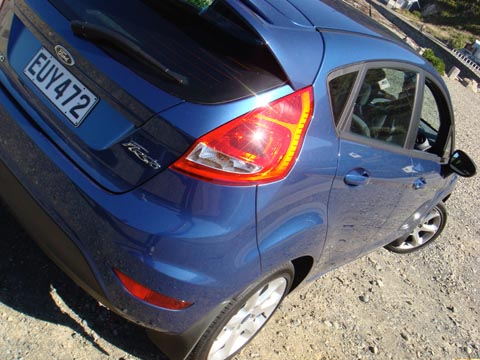|
THE FORD
FIESTA is a nameplate that has been
around for over 30 years. Sadly, for many of those years, Ford New
Zealand opted to sell the Festiva, which was a Korean-built Mazda
that had as much inspiration as dental floss. These days, however,
the B-segment, as Ford calls it, is so competitive that no one can
afford to field insipid Korean cars (letís leave that to Daewoo).
Ford, therefore, has pulled out all the stops for its worldwide
markets with the Mk VII Fiesta, or B299 in Ford-speak.
Itís about time, too. For decades, I have criticized
Ford for its worldwide marketing policies. For instance, the US
tended to get second-rate Fords, and in some segments, it still
does (look at their Focus, still based on the 1999 model), while
the company sells some of the best stuff outside North America.
Thanks to current boss Alan Mulally, who had a stint at a company
where different products for different regions would have been anathema
(he ran Boeing), Ford has finally realized that it can not only
get economies of scale, but create competitive products for every
market.
The trouble, however, has been the badge. As BMW
and others moved downmarket into Fordís traditional territoryóthe
3-series outsells the Mondeo in Britainósnobbery has meant that
Ford doesnít have the same cachet as it once did. But thatís all
right when it comes to the rest of us. It means Ford tries harder
to create kick-ass product and comes up with what Lucire
regards as the best-value and competent cars around.
The CD345 Mondeo, for
example, is probably the best handling front-wheel-drive sedan you
can buy, and is so large that it dwarfs Fordís own Falcon in numerous
key measurements. And the Fiesta also has that value-for-money,
ĎFord gives you more car between the wheelsí feeling. This is a
B-class car that feels nearly as big as Fordís own Focus, and is
cleverer to boot.
But we shouldnít say that. We should say that it will
steal sales from other companies, and after a week with our blue
B299, a mid-range Zetec manual, weíre left in no doubt that it will.
The immediate competition, Fordís arch-rival Holden,
is easily dispensed with: its rebadged Daewoo Gentra is more ancient
in car terms than the blue rinsers who buy it, even if no elderly
person these days gets a blue rinse. Then there are the usual suspects
from the Japanese brands, which fall behind the Fiesta in terms
of driveability and handling. The Peugeot 207 seems ill-equipped
by comparison, while our usual B-class fave, the Renault Clio, is
smaller, though performance-wise it feels revvy enough to keep up.
The exterior is funky, with the now-de rigueur
rising waistline and clamshell bonnet. But what we really love is
the way the spoiler and chunky rear lights meet. Car makers seem
to use an awful lot of plastic these days to get these details,
but here itís worth it. One needs to bear in mind that B299 was
developed in Germany, and these chaps are very conscientious about
recycling.
Step into the Fiesta and there is none of the feeling
that you are in a small car. The grade of plastic is better than
in the base Focus, and the interior is dominated, as Fordís designers
anticipated, by a centre console thatís meant to recall funky cellphones.
Unlike the now-dated fascia of the original 1999 Focus, this one
is practical, but the pièce de resistance (every car
must have one for us in the media) is the carís voice recognition.
Yes, ladies and gentleman, you can talk to this car,
just like KITT. It might have only
a limited number of commands, and the one I tried the most was the
radio tuner, but itís a feature that I last encountered on a far
more expensive BMW. This is the old
Ford philosophy of the early 1970s embodied once more: expensive
features mainstreamed in an everyday car. Which, of course, makes
it anything but everyday.
There are limitations. Various Lucire team members
tried their accents and it seems that Fordís voice recognition is
best trained to understand received pronunciation. A Scottish accent
also works on the Fiesta. Newzild has a reasonable success rate
though it is nowhere nearly as good as Keeley Hawes-grown-up; while
a northern Gene Hunt also seems to work with the car. What consistently
did not work, however, was a stereotyped Paul Hogan accent, with
the Fiesta tuning in to the wrong station. Australian buyers beware:
God help you, you might even need to sound Kiwi.
Bluetooth is very easy to hook up, compared to many
other cars, and unlike some brands we can think of, it imports the
information off oneís cell reliably.
On the first drive, the Fiestaís steering seems awfully
light. Ford explains that this is its adaptive steering, which means
it feels lighter at slow speeds, and one has to turn the wheel less
to make tighter manúuvres. While weíve had adaptive steering before,
it almost feels too light, though it means one-handed manúuvres
in and out of tight shopping car parking spaces (which is where
many Fiestas will visit) was remarkably easy. And as a daily driver,
taking the twisty turns up to Khandallah, it is a brisk and competent
handler.
Having had numerous passengers in the car, the Fiesta
is very roomy, reiterating today that small cars are not particularly
small. (For those keeping count, B299 is 1722 mm wide, which is
more than the Ford Sierra of the 1980s.)
The 1∑6-litre engine is
responsive and refined, which gives the Fiesta a big-car feel on
the motorway. In terms of fuel economy, we were getting between
38 and 39 mpg with a mixture of urban and motorway, which is between
6 and 6ľ l/100 km (in short, itís roughly, if not slightly better
than, what Ford expects one to get).
One down side is the Fiesta’s rear visibility.
That sexy rising waistline and the spoiler mean that rear vision
is more restricted, which is the price to pay when it comes to those
looks. In this respect, even the Daewoo has the Fiesta beat, thanks
to its six-light bodyshell, but competitors such as the Peugeot
207 and Suzuki Swift have large C-pillars to contend with. However,
the Fiesta leaves more to be desired in this respect.
We even did the infamous corpse test and found that
in the hatch, one can put an entire body into the boot (attempted
with a live publisher and not a real body). We can only imagine
that when the B409 Fiesta sedan comes out of the Thai and Indian
plants, it will be roomier still. Mafia wiseguys can get rid of
their Lincoln Town Cars.
But even if Ford has come up with the perfect B-class
caróand this is the best all-rounder we have come across and goes
to the top of the classódoes the badge have cachet?
In a country like New Zealand, where snobbery is more
frowned upon, then we vote yes. Itís proudly displayed on the front,
and along with the styling, projects a new confidence for the Blue
Oval. We donít even think its lines will date that quickly.
Stateside, Ford is already winning fans because of
the Big Three automakers, it didnít need money from the US
Government. And in many countries, such as China and India, we can
see the Fiesta putting up a great fight in the B-segment, becoming
the talked-about car.
Which leaves Europe. Thereís a huge choice there, but
Ford still holds a certain position when it comes to small cars.
We havenít tried the 2010 Volkswagen Polo or Citroën C3. The
Opel Corsa D might be refined but it looks boring alongside the
Fiesta. And the premium brands havenít managed to conquer the B-class
yet, with the exception of Mini. And we love the Mini.
So when it comes to a style statement, what would we
choose?
Probably the Alfa Romeo MiTo.
But those who find that too Italian, and the Mini too boy- (or girl-)
racer, then this is the car that suits every other taste quite well.
ē
Jack Yan is publisher of Lucire.
|
 |
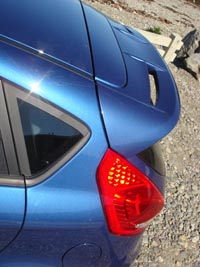
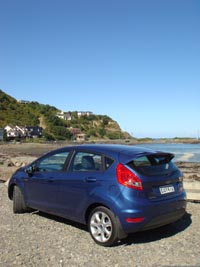 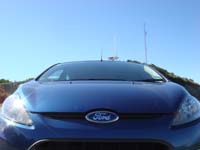
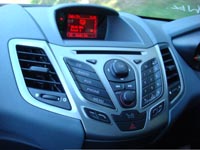
From top The spoiler is a neat touch on the Zetec. Chunky
rear lights are a feature of the rear view. The Ford badge is proudly
displayed. Inside, the centre console dominates. Bottom A
sporty rear view on the Fiesta.
What consistently did not work with the Ford’s
voice recognition, however, was a stereotyped Paul Hogan accent,
with the Fiesta tuning in to the wrong station. Australian buyers
beware: God help you, you might even need to sound Kiwi
|




